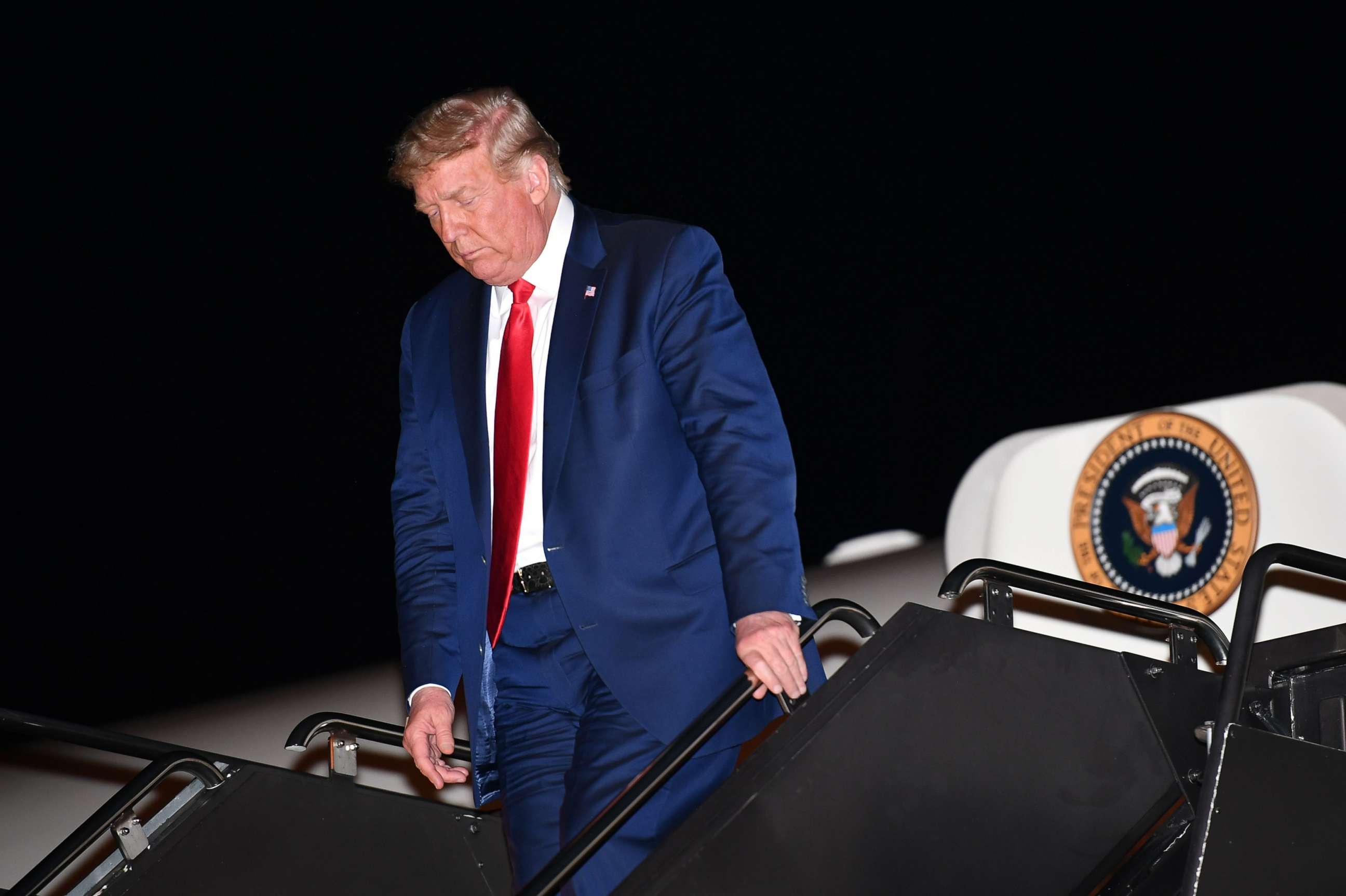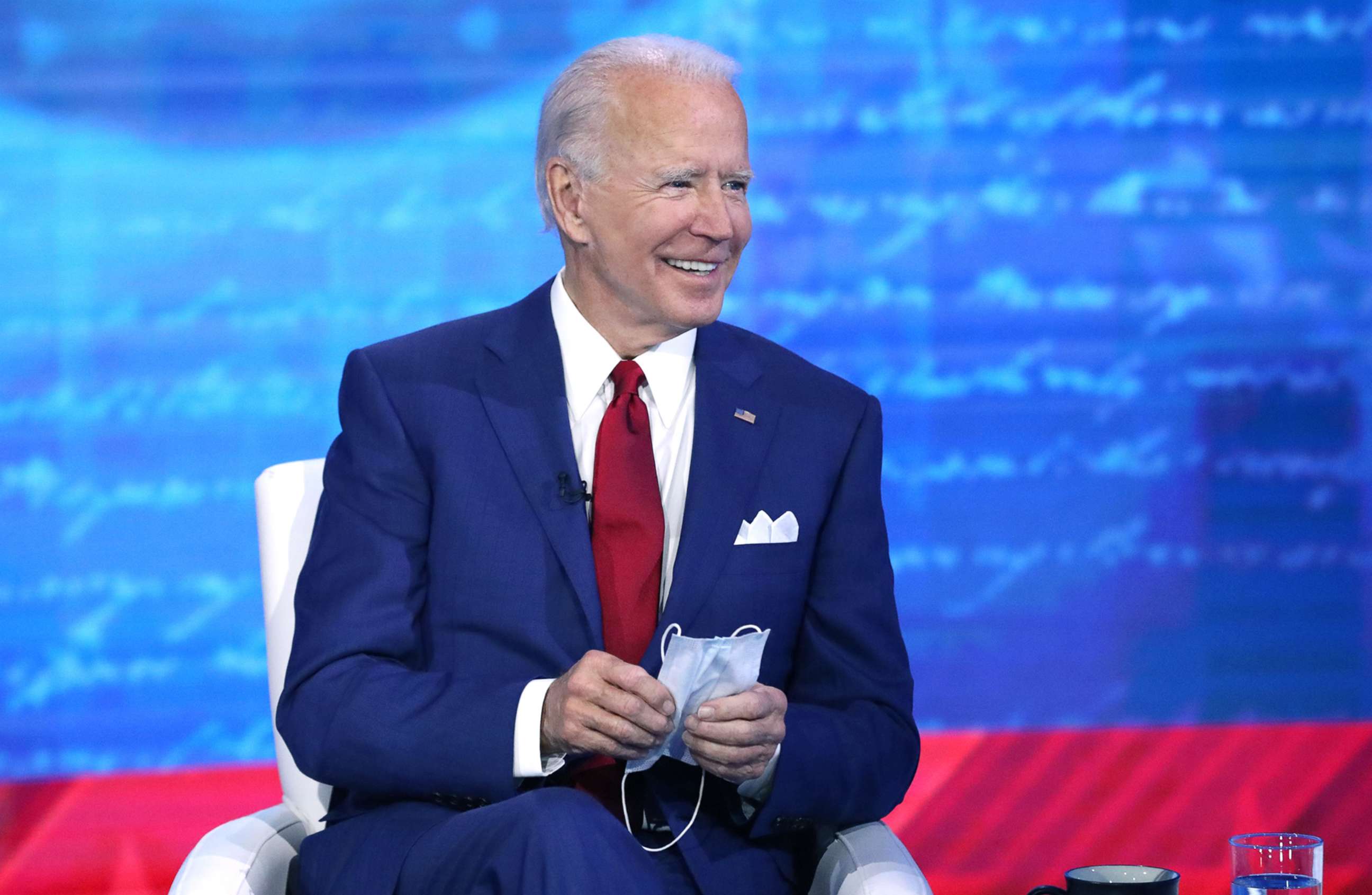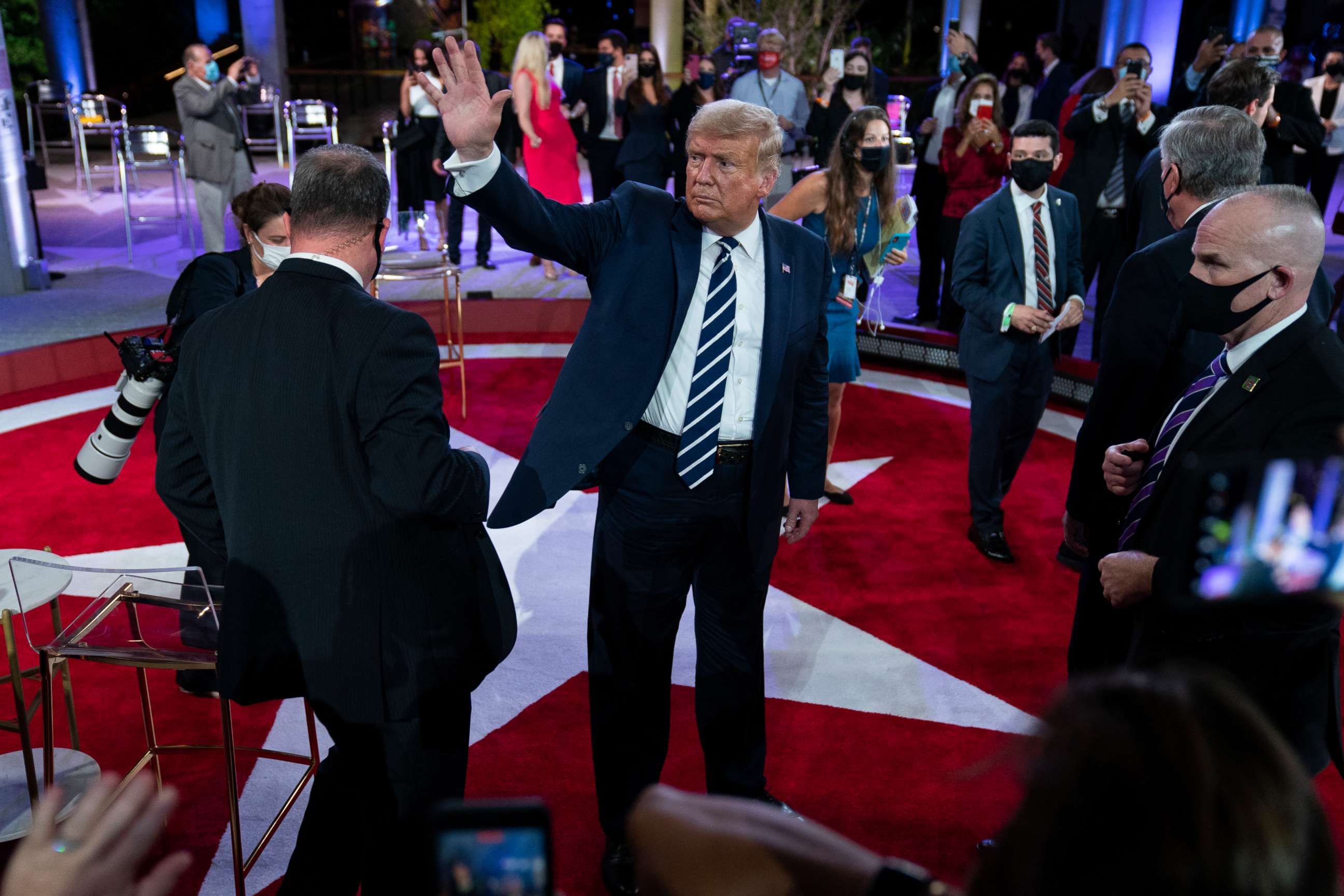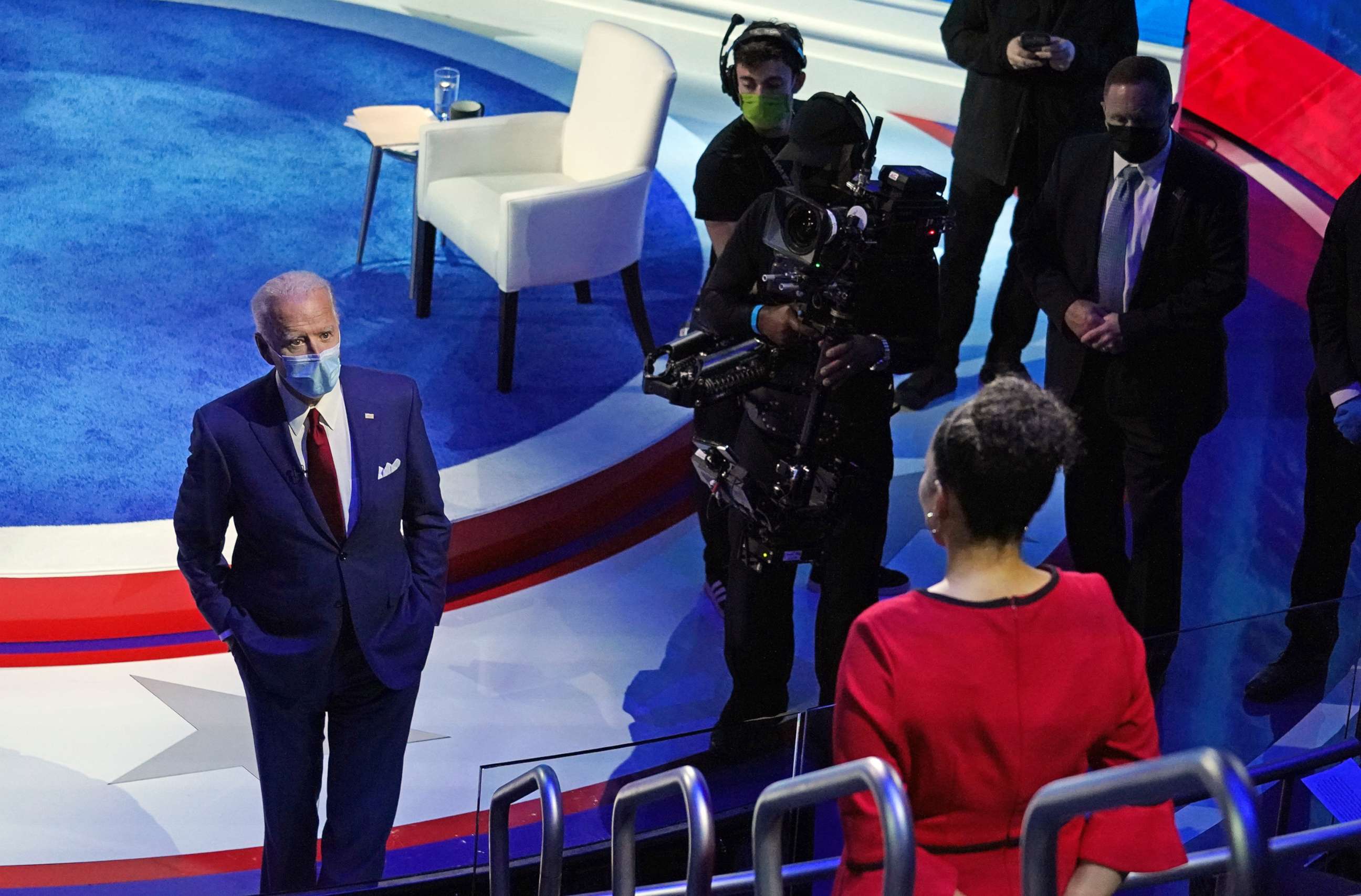Trump heads into final campaign stretch forced to play defense against Biden
The president's team is growing concerned over key battleground states.
President Donald Trump, down in the polls to Democratic presidential nominee Joe Biden and facing a once-unimaginable cash crunch, has been forced to spend the dwindling final weeks of his reelection fight on defense.
Out of the 13 rallies in nine states that the president has scheduled since returning to the campaign trail after being diagnosed with COVID-19, only one, Nevada, would be a pickup for the president -- the others show a president needing to spend valuable time and money predominantly campaigning in states he won in 2016, including some he won handily like Iowa.
Trump in recent days has also held rallies in Georgia and Florida, and is already scheduled to make his second swing through Pennsylvania and North Carolina since returning to the trail.
"I've just looked, a poll just came out, we're up six. OK, big deal. Didn't we win by 11 or something?" Trump said at a rally in Des Moines on Wednesday night. "We're up six. For me, to only be up six, I'm a little bit concerned."
Trump's public concern matches some growing internal uneasiness as the president's team continues to implement belt-tightening measures that include repeatedly cutting back on TV ad spending in crucial states in the final stretch of the campaign.

Internally, the Trump campaign is increasingly worried that the president's chances of winning North Carolina, a state the team has heavily invested in and views as essential for Trump's path to victory, has all but evaporated. The campaign had viewed the state as "super safe" as recently as just a few weeks ago, sources told ABC News.
Advisers now fear that, because the state counts and reports both day-of and mail-in votes together on election night, losing North Carolina could be a clear white flag.
Publicly, the Trump campaign remains optimistic.
“The President is going to win North Carolina and we feel very solid about it,” Trump campaign communications director Tim Murtaugh told ABC News, pointing to its grassroots effort on the ground in the state and polling that shows 42% of Democrats in the state prefer voting by mail and “if this is true, and current absentee ballot request trends continue, they are facing a historically low turnout.”
Despite that positive outlook, with the fallout from the first debate and Trump's contracting the novel coronavirus, some aides inside the campaign have started to grow fearful of what their employment prospects may look like if the president were to lose, sources said.
Meanwhile, Biden is expected to maintain his steady pace on the campaign trail in the battleground states his campaign believes give them as many paths to 270 electoral votes as possible.
Last week alone Biden visited the swing states of Ohio, Florida, Pennsylvania, Michigan and North Carolina -- all states that could see a return visit from the former vice president in the campaign's waning days. The Democratic nominee has also hemmed closed to the many safety precautions his campaign has adopted since they resumed travel amid the pandemic, opting for drive-in rallies and smaller, socially-distanced events where masks are required -- the polar opposite approach from Trump's campaign.
Biden's team is also eyeing multiple ways to spend its considerable war chest in the coming days.
In the crucial final two weeks of the election, the Trump campaign is being outspent by the Biden campaign on television ads $45 million to $54 million -- a spending gap that is further widened as pro-Biden outside groups are spending more than three times the amount pro-Trump outside groups are on the ad war.
Trump had been completely off the air in Iowa since July and is only now set to go back up in a state where polls currently show a more competitive race than 2016, when the president won by over nine points. Sources pointed to the president's recent Iowa rally as a way the team hoped to make up for the lack of ad spending in the state.
A recent Des Moines Register/Medicom Iowa poll shows the race in a dead heat between Trump and Biden, with 47% of likely voters in the state saying they'd support each candidate.
Overall, the president remains down double digits nationally, trailing Biden by over 10 points -- Biden's largest lead of the election -- according to FiveThirtyEight's average.

The president's team has also been pulling back spending in other states crucial to his White House win four years ago. Earlier this month, the campaign canceled more than $2 million worth of airtime in Ohio, pushing back its return to the state until the last two weeks of October after being mostly quiet since the summer. It's now among Trump's top markets entering the home stretch, with $5.3 million reserved for airtime from Oct. 20 through Election Day.
And in key states like Pennsylvania, Michigan and Wisconsin, the Trump campaign is being vastly outpaced by the Biden campaign. From September through Election Day, Trump has invested about $31 million in those three states, compared to Biden who has poured more than $110 million in those states during the same period.
When asked about cutting ads in crucial swing states, Trump campaign Deputy National Press Secretary Samantha Zager called TV ads "a small piece of the voter outreach puzzle" and said that "it makes no sense to run TV ads in states we know we’re going to win, and in other states, they’re a useful tool to reach the right voters with the right message."
"Considering President Trump won in 2016 and the D.C. establishment got itself worked up over the exact same issue then, maybe it’s time for the mainstream media to accept our winning strategy and start questioning why Joe Biden is needlessly overspending on TV," Zager added.
Needless or not, Biden and his ally groups are now spending double the amount Trump and his supporters are spending on television and radio ads. From Oct. 20 through Nov. 3, the Biden campaign, the Democratic National Committee and pro-Biden outside groups have reserved a total of $141.5 million of airtime, twice the $70.8 million that the Trump campaign and pro-Trump outside groups have reserved during the same period, according to ad spending data from media research firm CMAG.
One source close to the Trump campaign marveled that the team, which has raised over a billion dollars, is now struggling to compete when it matters.
"If Trump goes down, the big story will be how the campaign blew so much money and wasn't able to be up in key battleground states in the final stretch," the source told ABC News.
It's a sharp turn for a campaign that throughout last year touted efforts to expand the map into states like Colorado, New Mexico and even Oregon.
"We plan on also being in Minnesota very soon; I think New Mexico is in play in 2020," then-campaign manager Brad Parscale said on CBS News' "Face the Nation" in April 2019. "I think New Hampshire, I think we continue to grow the map. I think Nevada, you know even Colorado. And so those are, those are states we did not win in 2016 that I think are open for 2020."

But with the president's support and standing in the polls sinking and his team light on cash, the Trump campaign has since pulled back from targeting those long-shot states, spending only a combined total of $367,000 on television ads.
Last September, Trump held a rally in New Mexico -- a state he lost in 2016 by over eight points -- after Parscale said data from a neighboring El Paso, Texas, rally indicated the president could have a shot at flipping the state. But the president hasn't held a rally there since then, and the campaign has spent a total of $212,000 on television ads targeting voters there.
Around the same time, then flush with cash, Parscale was also publicly floating the idea of sending resources to flip Oregon, which a Republican hasn't won in over 35 years and which Trump lost by more than 10 points in 2016. Trump has still not traveled to the state for a rally, and the campaign has made no investments in television ads there.
Instead, the Trump campaign has largely focused on flipping Minnesota and New Hampshire, where the team has spent roughly $9 million and $3.4 million, respectively, including $4.3 million and $1.8 million reserved in the last two weeks of the election cycle.
But Biden remains ahead in those states, up by over 11 points in New Hampshire and nine points in Minnesota with two weeks to go, according to FiveThirtyEight.
With Trump's schedule and spending so focused on retaining must-win states, Democrats and Trump's rivals smell blood in the water.
"The greatest sign that Trump is in trouble is his own travel schedule," Mike Madrid, co-founder of The Lincoln Project, a political action committee comprised of anti-Trump former Republican political strategists, told ABC News. "Stops in Iowa and Georgia less than 20 days before an election can only mean one thing -- Trump's red wall is collapsing in on him."
Yet despite the president being down in the polls and trailing in fundraising, the Biden campaign is warning the race is closer than what recent public polling shows.

In a new memo sent to supporters and obtained by ABC News, Biden campaign manager Jen O'Malley Dillon warned against complacency among Democratic voters as the race enters its pivotal final weeks.
"The reality is that this race is far closer than some of the punditry we're seeing on Twitter and on TV would suggest. In the key battleground states where this election will be decided, we remain neck and neck with Donald Trump. In Arizona and North Carolina, for example, polling averages show us just three points ahead," O'Malley Dillon wrote in the memo.
When asked about being out-fundraised and outspent in the lead up to the 2020 election, the Trump campaign points to 2016, noting that then-Democratic presidential nominee Hillary Clinton and ally groups raised double what Trump did four years ago -- and the president still went on to win.
Recently, Trump himself has pivoted to defend against Biden leapfrogging his campaign in spending, arguing, "If you can win for less money that's a good thing, not a bad thing."
"You know money doesn't ultimately get you there," Trump said at a rally last week.
It's a stark reversal, given that the president's campaign deemed itself a fundraising "juggernaut" for well over a year.
At a rally in Janesville, Wisconsin, on Saturday night, the president argued he could be "the greatest fundraiser in history," but that didn't want to because, "if you do that ... when they call you in two months, three months, four months because they need something, you got to take their call and got to do it."
Despite the president's comments on Saturday night, an invitation obtained by ABC News indicated that Trump was set to attend a closed-door fundraiser Sunday night at "the home of Nicole and Palmer Luckey" -- where tickets ranged from $2,800 up to $100,000 per person.
ABC News' Johnny Verhovek contributed to this report.




